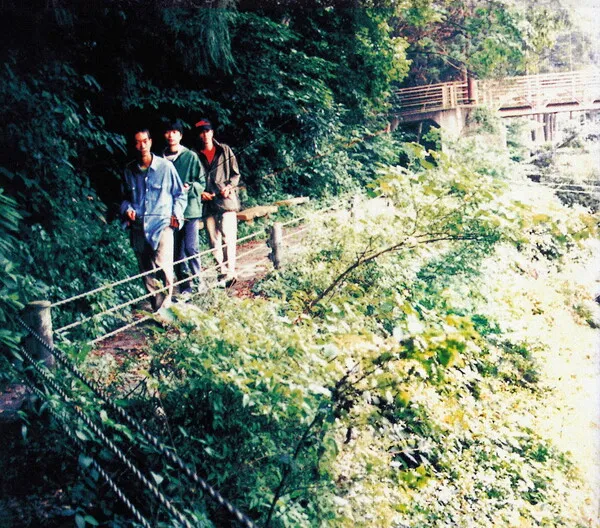

Fishmans
Fishmans, originally a Reggae and Dub band, was founded in the summer of 1987 at Meiji Gakuin University in Minato City, Tokyo by vocalist and cornet player 佐藤伸治 [Shinji Sato], drummer 茂木欣一 [Kin-ichi Motegi] and guitarist 小嶋謙介 [Kensuke Ojima]. All members of university club Song Lights, they eventually gained bassist 柏原譲 [Yuzuru Kashiwabara] who would replace temporary bassist Hisamatsu. This rounded the group off into their first stable four-man outfit. Throughout the late 80's they would continue performing at small independent venues across the boroughs of Tokyo, notably joining Captain Records in promotion of shared concerts alongside similar Ska groups. In particular, Fishmans would appear alongside fellow Captain Records bands SkaFunk, Mustang A.K.A., Kusu Kusu and ザ ポテトチップス [The Potato Chips] for their first studio appearance: a five-way various artists compilation, Panic Paradise. The album features Fishmans' songs "Special Night" and "いなごが飛んでる," the latter having been originally performed as early as 1985 by Sato's high school band, 時間 [Jikan].
Influential reggae producer こだま和文 [Kazufumi Kodama], responsible for the founding of Mute Beat met with the band later the same year, offering to record with the band. After his offer to record a Rocksteady album, Fishmans began the search for a fifth member, finding a willing keyboardist in HAKASE-SUN (then simply "Hakase") from fellow touring band Mustang A.K.A. With Hakase's help, Fishmans in their full five-man outfit would perform their first solo concert in April 1990, following by signing a recording deal with Virgin Japan - they were to record their first solo album, Kodama as producer. They began in February of 1991, travelling to Melbourne, Australia to record.
Fishmans' recording sessions in Melbourne for their first album were reportedly relaxed, assisted particularly by recording engineer Peter Blyton in their familiarization with the recording equipment provided. After the band's recording sessions concluded in the same month, Fishmans returned to Tokyo to release their first single on April 21, ひこうき (Hikouki), a teaser for their first album to be released later. In May this project was released, Chappie, Don't Cry mostly being a commercial failure despite reggae fans' approval of their sound. While disappointing, the failure of their first project did not deter the band, who continued on to self-produce another project in Japan. This released in November of 1991, Corduroy's Mood, a contrastingly winter-themed project to Chappie's notably summer-focused theming. Fishmans finished the year with further live performances, most notably performing alongside then-unknown rock group the pillows.
In May of 1992, Fishmans would begin recording a second studio album. Assisted by producer 窪田晴男 [Haruo Kubota], these sessions were known to have been shoddy and scattered. They would release no more singles to promote the album's release, and in October their second project King Master George would release to similar sales as their first album earned. Notably the album would feature a new recording of their single 100ミリちょっとの (100mm-Chottono), as well as a host of several new songs that would become staples of their live performances.
he following year, Fishmans began 1993 with the February release of Walkin', their first project produced by their third producer, ZAK. Having worked with the band during live performances since 1991, ZAK was well-aware of the band's preferences in sound and therefore became the group's mostly permanent in-house producer. He would continue with the band for their next single, いかれたBaby (Ikareta Baby) releasing in June to massive praise. The band's first breakout single, it would quickly become one of the band's most recognizable songs. It appeared a month later on the band's third studio album, Neo Yankees' Holiday, the last the band would record as a five-man outfit.
Our Sidebar
You can put any information here you'd like.
- Latest Posts
- Announcements
- Calendars
- etc